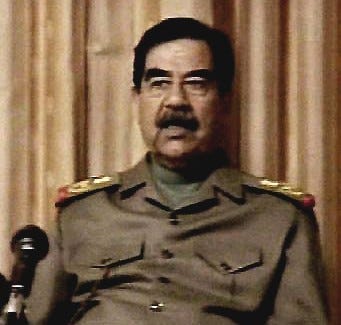Peace-mongers were wrong about the Iraq War too
Iraq is no longer a tyranny nor threat to its neighbors
At a time when pacifism and an "anti-war" movement is the last thing we need given the Putin threat, it is worth looking back to another occasion when aid and comfort were provided to a blood thirsty tyrant.
The Gen X and Gen Y "left" politically came of age marching in support of the Iraqi dictator Saddam Hussain. First there was his 1991 annexation of Kuwait. This was I think the first time anyone had done such a thing since Hitler swallowed up Czechoslovakia. Then there was the Americans invasion of Iraq in March 2003 to remove him and the Baath Party from power. "No War" and "No blood for oil" were the slogans of choice. And Stop the War Coalitions were all the thing.
In the first war it was pretty much only pacifists and "anti-imperialist" who opposed it. In the second there was a much wider spectrum of opposition. It was opposed by most governments including US allies and by public opinion generally. Even the pope and archbishops denounced it.
With the success of the lightning invasion there was an uptick in support but once the civil war kicked in and no "weapons of mass destruction " (WMDs) were found support reached new lows.
George W. Bush and Tony Blair were denounced by all and sundry as lying war criminals. That great peace monger and lover of dictators, Donald Trump reflected the mood. When asked in October 2015 whether he stood behind his 2008 interview where he said it would have been a “wonderful thing” if Nancy Pelosi had attempted to impeach President George W. Bush, Trump said this: “I think he was a disaster and I think it was one of the worst decisions ever made. [He] has totally destabilized the Middle East. If you had Saddam Hussein, you wouldn’t have the problems you have right now.”
So why did the Bush decide to invade in 2003? According to Melvyn Leffler, who interviewed virtually all the main American officials involved except G. W. Bush for his book, Confronting Saddam Hussein, they were thoroughly spooked by 9/11 and fully expected a second terrorist attack. If this happened they would be held responsible. They knew that any connection between Saddam and Al Qaeda was very unlikely. However, they saw a risk that Saddam may provide WMDs to other groups and the atmosphere was averse to even a remote risk. He had used them before on the Iranians and the Kurds, and had a nuclear program until the Israelis knocked it out. Post-Kuwait War UN resolutions required Saddam to cough up any WMDs. He denied he had any but was less than thoroughly cooperative when it came to confirming this. It was natural for people to suspect he had them especially when there was some intelligence, however shaky, suggesting he had them. As we all know none were found by the invading forces.
However, I think this is neither here nor there. Sanctions and containment was falling apart as a strategy to keep Saddam in his box, and once he was free of sanctions and weapons inspectors he would definitely have resumed his various WMD programs and then would have been far more difficult to deal with.
The new political system in Iraq is a vast improvement on the Baathist regime. It replaces a fascist one that killed and terrorized its own people and threatened its neighbors. There are regular elections involving dozens of political parties and there is a civil society outside of state control.
There is a diverse range of local media and ready access to the international offering. Under Saddam the state totally controlled the media and satellite dishes were banned.
Iraqis have a lot of reasons to be dissatisfied with their political system, particularly because of the corruption and sectarianism. However, they are in a position to fight to change things. For example, the 2019-20 protests would have been impossible under the Baathists. Any opposition to their regime was met with guaranteed torture and death for both the perpetrators and their families.
The overthrow of the regime removed a threat to its neighbors and created conditions more conductive to the battle for democracy in the region. Of course, for conservatives the idea of democracy in that part of the world is anathema, and for pseudo leftists opposition to "imperialism" is the primary concern.
The regime change process was bound to be tortuous because of the fractured nature of Iraq with its Shiite Arabs, Sunni Arabs, Kurds and tribalism.
The Americans mistakenly believed that they would be received with open arms by the Iraqis. What they found instead were Sunni who resented losing their privileged position, and Shiites and Kurds who did not trust them because they had been betrayed and let down in the past.
The Americans then fowled up badly by a total failure to come up with the policies and the resources required for occupation and regime change. In particular, they should have had a much larger military presence to provide security given the weapons lying around, the internecine friction and the looting. The blame for this lies with Defense Secretary Rumsfeld who ignored the advice of his generals who had recommended a much larger force. The Abu Ghraib prisoner abuse scandal made everything worse.
We then had the Obama pullout just in time for the emergence of Daesh accompanied by the West's criminal neglect of Syria. And of course the rest of present US MENA policy and practice is a disaster but that 's another story.




